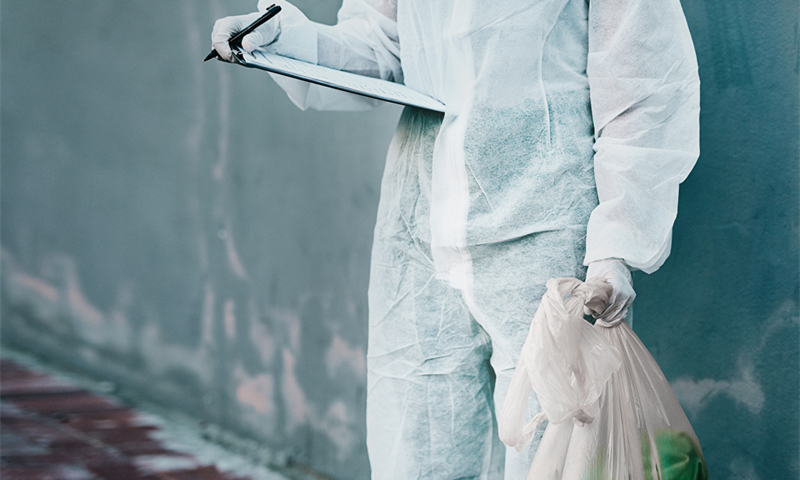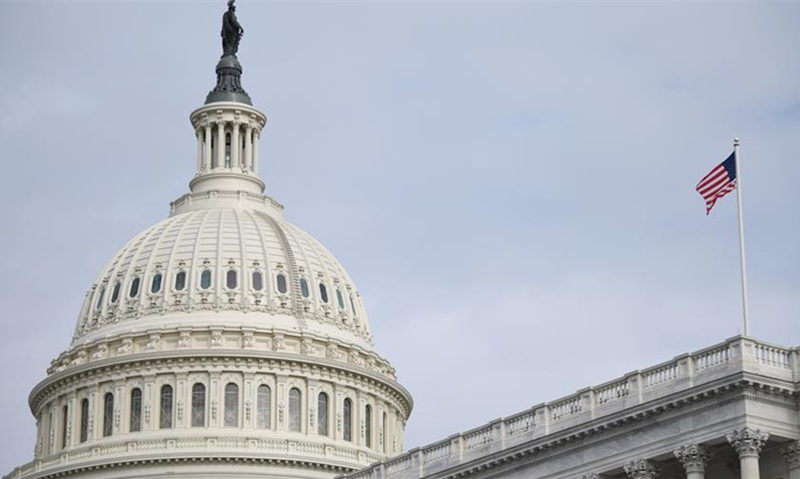The Fort Detrick horror: a closer look at the US’ largest biochemical weapons research center
By Huang Lanlan and Li Lei Source:Global Times Published: 2020/5/29 21:53:41

File photo: VCG
The Trump administration seems to turn a blind eye to growing international appeals for an investigation into an infectious disease research lab under the US Army, which once again shows its irresponsibility and arrogance on the novel coronavirus (COVID-19) pandemic, observers said.The US Army Medical Research Institute of Infectious Diseases (USAMRIID) at Fort Detrick, Maryland, is causing wide anger for its reopening in April regardless of the US and global citizens' opposition after months of shutdown for reported "structural defects."
The public doubts the possible link between the institute and a series of deadly disease outbreaks in this country, including the ongoing COVID-19 pandemic that has caused some 103,000 deaths as of Thursday local time.
Experts slammed the US for its evasive, ostrich-like attitude towards the rising voices calling for a USAMRIID investigation, while slandering a laboratory in China's Wuhan city for "originating" the coronavirus.
Only an open, transparent investigation can be a persuasive response for the US, said Ni Feng, director of the Institute of American Studies at the Chinese Academy of Social Sciences.
"The US' current attitude reflects its deep-rooted double standard," Ni told the Global Times Thursday.
A spotty history
USAMRIID, the US largest research center for biochemical weapons, has long been enmeshed in scandal.
The institute once had shady connections with Unit 731, a Japanese Imperial Army unit notorious for its atrocious and lethal chemical experimentation on Chinese and Russian people during World War II, said a Chinese biosecurity expert who spoke on anonymity.
The US had a backdoor deal with then detainees of Unit 731 after the war, granting immunity from prosecution to many of the unit's members in exchange for its biological warfare and experiment data for USAMRIID, the expert told the Global Times Friday.
For years the public had known little about what was going on inside USAMRIID. Its nearby citizens, however, had made frequent accusations and claims, saying their health was largely harmed by its biochemical pollution.
In 2006, a petition that asked local senators to take a further look at a possible "cancer cluster" near the institute got more than 14,000 signs on US petition website Change.org.
Randy White, a resident who initiated the petition, denounced the "reckless practices" of the US army who "buried dangerous chemical weapons" at Fort Detrick near their home, which he said had made over 2,500 people, including his wife and daughter, die from "a rare form of cancer."
All this time, the US army has continued to block calls for accountability, dismissing hundreds of health claims from sick residents, White wrote in the petition.
"They've created a major health emergency, and they're refusing to acknowledge it, even as people continue to get sick and die," he added. "That's unacceptable."
White has not yet replied to the Global Times' interview request as of Friday.
More suspicion and blame on USAMRIID occurred when an unprecedented e-cigarette or vaping product use associated lung injury (EVALI) broke out in its surrounding areas in August 2019.
According to researchers who examined samples of lung tissue from 17 EVALI patients, all the samples implied the people "had been exposed to toxic chemicals," reported the New York Times in October.
Days before the institution's temporary shutdown in 2019, a respiratory illness was reported on June 30 at a community one hour's drive away. The Greenspring Retirement Community in Fairfax County, Virginia, had had 63 infected cases of the disease and three deaths by July 15, said local health authorities.
In an email response to the Global Times on Friday, Fairfax County Health Department said there had been an established etiology for the outbreak of the illness. "Testing of specimens collected showed several bacteria, including Haemophilus influenzae (H. flu) and rhinovirus," it wrote, saying these were "the cause of the common cold."
Nonetheless, this epidemic has recently led to speculation on its probable relevance to USAMRIID on US social media aimed at the COVID-19 pandemic. A Twitter user named "The Paper" posted in March that his bet of the virus escaping from the institute was "a 50 percent or higher chance."
Similarly, in the past flu season in the US, which has reportedly infected over 32 million people and caused 18,000 deaths, some of the deaths were acknowledged by CDC Director Michael Redfield as COVID-19 caused, which has brought USAMRIID greater controversy.
"...We have reasons to ask the US government to publish the real reason for the close of Fort Detrick, to clarify whether the laboratory is the research unit for the new coronavirus and whether there is a virus leak," wrote netizen "B.Z." on a White House website, petitioning for more USAMRIID information.
B.Z., as well as many other US netizens, have been pointing the finger at the US information cover-up of USAMRIID, saying "a large number of English news reports about the close of Fort Detrick were deleted, displaying '404 not found.'"
A few Chinese experts told the Global Times they have similar experiences when searching USAMRIID-related information on Google. The Global Times reporter also failed to access some pages of the institute.

The Capitol Hill in Washington D.C., the US, December 4, 2019 (photo: Xinhua)
Secrecy and deceptionThe US army and intelligence departments have long practiced secrecy and deception, which run counter to the principles of transparency and authenticity, the anonymous bio-security expert reached by the Global Times said.
"Worse still, they have the 'power' to bypass the Biological Weapons Convention (BWC) restrictions and public scrutiny," said the expert, adding that the US has been obstructing negotiations for a BWC protocol with a verification regime for some 20 years.
While keeping outside international norms, the US has been maintaining the world's largest bio-defense systems, increasing bio-security risks to the people of its country and the world, he added.
A previous investigation reveals that "hundreds of lab mistakes and safety near-miss incidents have occurred" at US biological institutes in recent years, reported USA Today in 2015.
The safety and management of the biological labs erected in its homeland and overseas have been a great global concern as multiple complaints have been filed against these biological labs for causing health problems, said Li Haidong, a professor at the Institute of International Relations of the China Foreign Affairs University.
"The US on one hand strains every nerve to keep its biological labs secret, while trying its best to peep into other country's biological labs," Li told the Global Times Thursday, adding that he thinks a purpose of the US proposal to investigate Wuhan Institute of Virology is to obtain information it is interested in.
The US established a dozen biological laboratories around Russia to maintain its dominant position in the world during geopolitical competition by threatening Russia and China, Li said.
"It is fair to say that the US has been putting its global dominance over the safety of human beings, including its own citizens," he said.